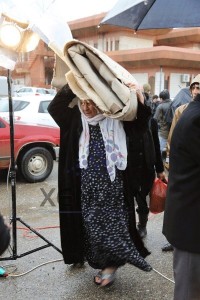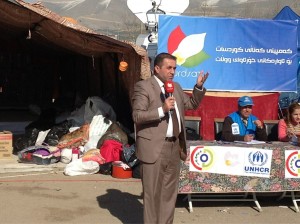International support of Kurdish uprising in Syria
For a long time after the Syrian uprising began almost two years ago, West Kurdistan (the Kurdish northern parts of Syria, also called Rojava) remained free of fights between the regime and the Free Syrian Army.
This has since changed and especially the Kurdish town Serê Kaniye has been the scene of heavy clashes among Kurdish fighters and armed gangs backed by Turkey. This has resulted in the deaths of many civilians, Kurds are fleeing their homes and others are left vulnerable to attacks from both regime soldiers and opposition gangs.
It has prompted Kurds both in Kurdistan and the diaspora to show their support of Kurds in Syria.
Recently a Kurdish channel in the Kurdistan Regional Government arranged a telethon to collect donations for Kurdish refugees from Syria. Using the hashtag #RojawaAid, people shared updates on the amount of money raised, what other donations one could make and what value it had for the entire Kurdistan that Kurds got together to help one another in a time of war.
@NuhaSerrac: @Kurdsat is asking us to remember 1991 when our brothers and sisters supported us. History is repeating itself. #RojawaAid
@KarokhNuraddin: Various major firms donating thousands of dollars live on air on #Kurdsat TV for #Syrian refugees. #RojawaAid
@LawenAzad: Altun Supermarket has donated lots of food and clothing to the refugees @Kurdsat #RojawaAid
@NuhaSerrac: Asiacell donates $100,000 to ROJAWA! #RojawaAid
Others tweeted pictures of people handing in clothes and other donations.
The members of parliament for the pro-Kurdish party BDP in Turkey regularly declare their support to the Kurdish uprising in Syria. The party’s co-chair Gultan Kişanak has said that the party “strongly condemn Turkey’s involvement and backing of the armed jihadist groups in Serê Kaniyê.”
Aysel Tuğluk, co-chair of the Democratic Society Congress (DTK) in Turkey, said during a recent protest in Nuseybin that Turkey is opposing the Kurdish self-rule and has been organising and arming groups who have clashing with Kurdish fighters. She called on Turkey to respect the democratic powers in Syria:
“Kurds are leading the democratic revolution in the Middle East. The people of Rojava have carried out a political revolution and practiced self-governance on the basis of the great struggle they have been giving for years now. [The women] have played a great role in the Kurdish revolution in Rojava and defeated the male-dominant system in the territory.”
“The people of Rojava are not alone. Kurds in Kurdistan will defend them at any cost.”
Demonstrations of solidarity have been arranged in the diaspora too. The video is from a protest in Sweden and the first speaker is saying that Turkey supports fundamentalists and terrorists and let them cross the border from Turkey and into Syria to kill civilians. The second speaker underlines the fact that Kurds in Syria were the first to support the uprising and have taken an active role since the first day.
Kurdish musicians have also worked together to make music as a sign of solidarity. The renowned artist Nizamettin Ariç has recently released a song called “The pain of Rojava” which is sung by him and Misgîn Tahir. At the end of the video is a line by the late legendary Kurdish poet, Cigerxwin, that reads: “If you do not become one, you will disappear one by one.”
A video from 2012 featured the famous musicians Ciwan Haco, Şivan Perwer, Nizamettin Ariç, Hanî and Mizgîn Tahir to show their support of Kurdish rights in the Syrian revolution:
Freedom is when the Kurds in Syria can live out their culture and language and can take their representation into their own hands. (Nizamettin Ariç)
Equality is when Kurdish children are educated in their own language just like those children of the majority. (Şivan Perwer)
Security is when not one Kurd in Syria has to fear the secret service. (Hanî)
Democracy is when Kurdish parties in Syria are also on the ballot in elections. (Mizgîn Tahir)
Justice is when also a Yezidi Kurd can become the president of Syria. (Ciwan Haco)


Comments
Pingback: Ön şartımız yok, ama… « YERELCE